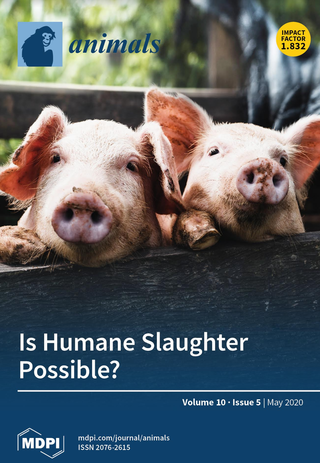Deception
Do Animals Care About Their Future?
A response to one of our commentators.
Posted August 27, 2020

In a recent post, I discussed a paper I published with Heather Browning in the journal Animals on whether humane animal slaughter is possible. Since I have received numerous replies, I would like this opportunity to answer the questions that have been raised and respond to the criticism that has been uttered against our position.
(Context: We have defended the claim that animal slaughter can never be truly humane since animals will inevitably lose the possibility of future welfare—consisting of pleasure and other positive affective states such as excitement—if they are killed prematurely.)
3rd Comment:
"... animals do emphatically care about whether their future is good or bad."
Cite? Most, if not all, non-human animals don't have the neurology to construct insight into a future. Given that past and future don't actually exist, except as abstract human ideas, this anthropomorphization of non-human animals seems unwarranted.
Murder is specifically a legal term involving humans, premeditation, and malice. Killing non-human organisms is not murder, and killing plants is as morally "problematic" as killing non-human animals. Pretending humans can live outside nature is egosyntonic self-deception and hubristic.
Heather Browning and Walter Veit:
This is an important reply. Indeed, it has been raised in the literature. So it will be useful here to look at how we replied in print:
Another counterargument to our view comes from Belshaw [...] who argues that though death is bad for an animal, it is not bad in a way that matters morally. Much as lack of oil is bad for a tractor, we do not feel it creates any moral duties in us, so too is the death of an animal. He argues that it is only the desire for future life that makes death matter morally, particularly when it thwarts our plans and projects. As animals lack a conception of themselves as a being persisting through time, they cannot have such preferences for their future existence. At best, their desire for a continued future is instrumental—they may desire future experiences for the pleasure they create, but not continued life itself. (Browning and Veit 2020, p. 5-6)
However, the assertion that animals lack a conception of themselves that persists through time requires evidence itself. The lack of evidence should not automatically imply that we can treat other animals as if we have certainty that they do not feel pain or care about their future. We have argued that this is similar to the "claim that animals can only be harmed by death if they possess the ability of ‘mental time travel’—a capacity to understand oneself as a being existing through time, to remember oneself in the past and imagine oneself as continuing into the future" (Browning and Veit 2020, p. 6).
We have two responses.
Firstly, it is not necessary for animals to possess such sophisticated cognitive modeling capacities regarding their future. What matters is whether we take away their opportunities for future pleasure, for future welfare and happiness. For this, it doesn't matter whether animals can conceive of future pleasure in the present. If a human had a cognitive disability and could not conceive of their future—it would nonetheless be ludicrous to assert that we could simply kill them—less so in a humane way. Though we do accept that killing someone who has future-directed desires would be worse than killing someone who doesn't. The point is merely that neither is humane.
Secondly, there is quite interesting research now being done on whether animals have an understanding of death as a concept and phenomenon. In our paper, we have tentatively included a number of links. We hope that interested readers will take a look.
For evolutionary reasons, however, it is indeed plausible that many animals would possess such an ability, since animals that can "anticipate the future will benefit from anticipation of future events and have a stronger interest in their continued life" (Browning and Veit 2020, p. 6). Nevertheless, we decided to leave this question open to future empirical investigation:
For now, we will remain agnostic on the question, but simply flag here that if it were the case—at least, if animals were able to understand the fact of their own upcoming death—it would actually further increase the harm of slaughter. Until we know more about animals, it might be premature to accept that they lack this understanding. (Browning and Veit 2020, p. 6)
We hope to be engaged in future empirical work that could help us to better understand the minds of animals and thus what makes their lives go better (and worse). Thanks for the comment!


